It is feasible to obtain the transferred traffic amount using android.net.TrafficStats. Here is an implementation of this idea which measures the up-stream and down-stream transfer rate. You can measure the rate of mobile network by passing TrafficSpeedMeasurer.TrafficType.MOBILE to the TrafficSpeedMeasurer constructor, otherwise using TrafficSpeedMeasurer.TrafficType.ALL will result in measuring general traffic (WiFi/Mobile). Also by setting SHOW_SPEED_IN_BITS = true in MainActivity you can change the unit of speed measuring to bits per second.
MainActivity.java
import android.os.Bundle;
import android.support.v7.app.AppCompatActivity;
import android.widget.TextView;
public class MainActivity extends AppCompatActivity {
private static final boolean SHOW_SPEED_IN_BITS = false;
private TrafficSpeedMeasurer mTrafficSpeedMeasurer;
private TextView mTextView;
@Override
protected void onCreate(Bundle savedInstanceState) {
super.onCreate(savedInstanceState);
setContentView(R.layout.activity_main);
mTextView = findViewById(R.id.connection_class);
mTrafficSpeedMeasurer = new TrafficSpeedMeasurer(TrafficSpeedMeasurer.TrafficType.ALL);
mTrafficSpeedMeasurer.startMeasuring();
}
@Override
protected void onDestroy() {
super.onDestroy();
mTrafficSpeedMeasurer.stopMeasuring();
}
@Override
protected void onPause() {
super.onPause();
mTrafficSpeedMeasurer.removeListener(mStreamSpeedListener);
}
@Override
protected void onResume() {
super.onResume();
mTrafficSpeedMeasurer.registerListener(mStreamSpeedListener);
}
private ITrafficSpeedListener mStreamSpeedListener = new ITrafficSpeedListener() {
@Override
public void onTrafficSpeedMeasured(final double upStream, final double downStream) {
runOnUiThread(new Runnable() {
@Override
public void run() {
String upStreamSpeed = Utils.parseSpeed(upStream, SHOW_SPEED_IN_BITS);
String downStreamSpeed = Utils.parseSpeed(downStream, SHOW_SPEED_IN_BITS);
mTextView.setText("Up Stream Speed: " + upStreamSpeed + "\n" + "Down Stream Speed: " + downStreamSpeed);
}
});
}
};
}
TrafficSpeedMeasurer.java
import android.net.TrafficStats;
import android.os.Handler;
import android.os.HandlerThread;
import android.os.Looper;
import android.os.Message;
import android.os.SystemClock;
public class TrafficSpeedMeasurer {
private ITrafficSpeedListener mTrafficSpeedListener;
private SamplingHandler mHandler;
private TrafficType mTrafficType;
private long mLastTimeReading;
private long mPreviousUpStream = -1;
private long mPreviousDownStream = -1;
public TrafficSpeedMeasurer(TrafficType trafficType) {
mTrafficType = trafficType;
HandlerThread thread = new HandlerThread("ParseThread");
thread.start();
mHandler = new SamplingHandler(thread.getLooper());
}
public void registerListener(ITrafficSpeedListener iTrafficSpeedListener) {
mTrafficSpeedListener = iTrafficSpeedListener;
}
public void removeListener() {
mTrafficSpeedListener = null;
}
public void startMeasuring() {
mHandler.startSamplingThread();
mLastTimeReading = SystemClock.elapsedRealtime();
}
public void stopMeasuring() {
mHandler.stopSamplingThread();
finalReadTrafficStats();
}
private void readTrafficStats() {
long newBytesUpStream = (mTrafficType == TrafficType.MOBILE ? TrafficStats.getMobileTxBytes() : TrafficStats.getTotalTxBytes()) * 1024;
long newBytesDownStream = (mTrafficType == TrafficType.MOBILE ? TrafficStats.getMobileRxBytes() : TrafficStats.getTotalRxBytes()) * 1024;
long byteDiffUpStream = newBytesUpStream - mPreviousUpStream;
long byteDiffDownStream = newBytesDownStream - mPreviousDownStream;
synchronized (this) {
long currentTime = SystemClock.elapsedRealtime();
double bandwidthUpStream = 0;
double bandwidthDownStream = 0;
if (mPreviousUpStream >= 0) {
bandwidthUpStream = (byteDiffUpStream) * 1.0 / (currentTime - mLastTimeReading);
}
if (mPreviousDownStream >= 0) {
bandwidthDownStream = (byteDiffDownStream) * 1.0 / (currentTime - mLastTimeReading);
}
if (mTrafficSpeedListener != null) {
mTrafficSpeedListener.onTrafficSpeedMeasured(bandwidthUpStream, bandwidthDownStream);
}
mLastTimeReading = currentTime;
}
mPreviousDownStream = newBytesDownStream;
mPreviousUpStream = newBytesUpStream;
}
private void finalReadTrafficStats() {
readTrafficStats();
mPreviousUpStream = -1;
mPreviousDownStream = -1;
}
private class SamplingHandler extends Handler {
private static final long SAMPLE_TIME = 1000;
private static final int MSG_START = 1;
private SamplingHandler(Looper looper) {
super(looper);
}
@Override
public void handleMessage(Message msg) {
switch (msg.what) {
case MSG_START:
readTrafficStats();
sendEmptyMessageDelayed(MSG_START, SAMPLE_TIME);
break;
default:
throw new IllegalArgumentException("Unknown what=" + msg.what);
}
}
void startSamplingThread() {
sendEmptyMessage(SamplingHandler.MSG_START);
}
void stopSamplingThread() {
removeMessages(SamplingHandler.MSG_START);
}
}
public enum TrafficType {
MOBILE,
ALL
}
}
ITrafficSpeedListener.java
public interface ITrafficSpeedListener {
void onTrafficSpeedMeasured(double upStream, double downStream);
}
Utils.java
import java.util.Locale;
public class Utils {
private static final long B = 1;
private static final long KB = B * 1024;
private static final long MB = KB * 1024;
private static final long GB = MB * 1024;
public static String parseSpeed(double bytes, boolean inBits) {
double value = inBits ? bytes * 8 : bytes;
if (value < KB) {
return String.format(Locale.getDefault(), "%.1f " + (inBits ? "b" : "B") + "/s", value);
} else if (value < MB) {
return String.format(Locale.getDefault(), "%.1f K" + (inBits ? "b" : "B") + "/s", value / KB);
} else if (value < GB) {
return String.format(Locale.getDefault(), "%.1f M" + (inBits ? "b" : "B") + "/s", value / MB);
} else {
return String.format(Locale.getDefault(), "%.2f G" + (inBits ? "b" : "B") + "/s", value / GB);
}
}
}
.
Visual Result

